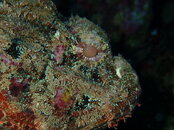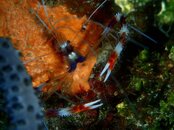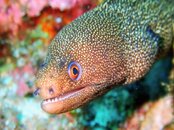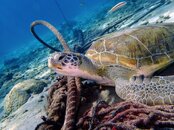Hi there! I am new to diving (got my certification in Thailand a couple months ago and am now doing more diving in the Philippines) and looking to get into underwater photography. I have a Nikon DSLR 3500 that I use already but I’m not ready to spend several thousand on a housing for it. Does anyone have any suggestions for something a bit more budget friendly that I can use and develop my skills with for a few years before I’m ready to fully invest into getting a housing for my Nikon. Any suggestions are helpful!
You are using an out of date browser. It may not display this or other websites correctly.
You should upgrade or use an alternative browser.
You should upgrade or use an alternative browser.
Underwater Photography Gear (Beginner)
- Thread starter sea.diver
- Start date
Please register or login
Welcome to ScubaBoard, the world's largest scuba diving community. Registration is not required to read the forums, but we encourage you to join. Joining has its benefits and enables you to participate in the discussions.
Benefits of registering include
- Ability to post and comment on topics and discussions.
- A Free photo gallery to share your dive photos with the world.
- You can make this box go away
Since you're asking... New divers have relatively poor buoyancy control and poor situational awareness. They get a camera in their hands and then trash the reef, kicking and breaking coral, etc., And new divers have NO IDEA of the carnage and broken coral they leave behind them.
A new diver has no business getting anywhere near the reef with a camera.
So... Ask your question again when you can say that you've mastered buoyancy, you've got a solid quiver of kicks (including the back kick), and you've got at least 100 dives under your belt.
A new diver has no business getting anywhere near the reef with a camera.
So... Ask your question again when you can say that you've mastered buoyancy, you've got a solid quiver of kicks (including the back kick), and you've got at least 100 dives under your belt.
Ouch. Well, everyone was new once. For sure buoyancy is super important for photography (and for protecting the fragile environment and not kicking up the sand and silt for fellow divers too).
All that said, once we felt ready we started with a GoPro in a case with no lights just to log some memories. The small size made it easy to handle. There are cheap knockoffs too but we tried one and picture quality sucked.
Good luck and congratulations on the new certification. I hope you get as much enjoyment out of diving as many of us have over the years. You are certainly in a great place for diving . Be sure to share some cool pictures on SB.
. Be sure to share some cool pictures on SB.
All that said, once we felt ready we started with a GoPro in a case with no lights just to log some memories. The small size made it easy to handle. There are cheap knockoffs too but we tried one and picture quality sucked.
Good luck and congratulations on the new certification. I hope you get as much enjoyment out of diving as many of us have over the years. You are certainly in a great place for diving
Since you're asking... New divers have relatively poor buoyancy control and poor situational awareness. They get a camera in their hands and then trash the reef, kicking and breaking coral, etc., And new divers have NO IDEA of the carnage and broken coral they leave behind them.
A new diver has no business getting anywhere near the reef with a camera.
So... Ask your question again when you can say that you've mastered buoyancy, you've got a solid quiver of kicks (including the back kick), and you've got at least 100 dives under your belt.
I feel like I phrased my question poorly but maybe I am just jumping the gun a bit. I’ve used a rented GoPro on a couple dives just to get a few videos here and there and had no issues with buoyancy. I have been told that my buoyancy control is excellent given my experience level by multiple dives masters and I have definitely always been very conscientious of the reef and aware of where my guide is. Damaging the reef was my biggest fear when I started so it is something I am always mindful about.Since you're asking... New divers have relatively poor buoyancy control and poor situational awareness. They get a camera in their hands and then trash the reef, kicking and breaking coral, etc., And new divers have NO IDEA of the carnage and broken coral they leave behind them.
A new diver has no business getting anywhere near the reef with a camera.
So... Ask your question again when you can say that you've mastered buoyancy, you've got a solid quiver of kicks (including the back kick), and you've got at least 100 dives under your belt.
All that being said I am a beginner so maybe I am getting ahead of myself. I was just looking for something small that is more centered around photography rather than videography. Something to use here and there when I dive, not the main reason behind the dive. But something that has high enough quality to be able to use more as I get more comfortable diving and go deeper into underwater photography.
All that being said would it still be too early to start taking a camera down after 25-30 dives?
An other low cost option could be a phone housing like the sea life or similar.
We went from the GoPro to a TG-5 (new ones are out too) for Macro and then added a strobe, frame, lights, …
Somehow my wife Nathalie has now graduated to a full hard shell carryon case full of lights lenses and, and …. It’s a slippery slope that underwater photography
Good luck to you and have fun!!
We went from the GoPro to a TG-5 (new ones are out too) for Macro and then added a strobe, frame, lights, …
Somehow my wife Nathalie has now graduated to a full hard shell carryon case full of lights lenses and, and …. It’s a slippery slope that underwater photography
Good luck to you and have fun!!
I would suggest you wait another dozen or so. If you get too focused on photography you may get yourself into other trouble, losing your buddy, crossing into a deco situation, running low on air etc. One you are truly comfortable, but not complacent, consider photography. That said, keep it simple to start, get a TG-5 or 6. Take it without a housing, this helps keep it simple, and keeps you shallow, 45 feet or less.I feel like I phrased my question poorly but maybe I am just jumping the gun a bit. I’ve used a rented GoPro on a couple dives just to get a few videos here and there and had no issues with buoyancy. I have been told that my buoyancy control is excellent given my experience level by multiple dives masters and I have definitely always been very conscientious of the reef and aware of where my guide is. Damaging the reef was my biggest fear when I started so it is something I am always mindful about.
All that being said I am a beginner so maybe I am getting ahead of myself. I was just looking for something small that is more centered around photography rather than videography. Something to use here and there when I dive, not the main reason behind the dive. But something that has high enough quality to be able to use more as I get more comfortable diving and go deeper into underwater photography.
All that being said would it still be too early to start taking a camera down after 25-30 dives?
You can get some really nice shots. Eventually get a housing for it, and then a video light, or strobe.
A couple images from an unhoused TG-5
Attachments
Okay thank you! I’ll for sure get some more dives under my belt but its nice to get an idea of what pictures look like with a camera vs. GoPro! Awesome photos!I would suggest you wait another dozen or so. If you get too focused on photography you may get yourself into other trouble, losing your buddy, crossing into a deco situation, running low on air etc. One you are truly comfortable, but not complacent, consider photography. That said, keep it simple to start, get a TG-5 or 6. Take it without a housing, this helps it simple, and keeps you shallow, 45 feet or less.
You can get some really nice shots. Eventually get a housing for it, and then a video light, or strobe.
A couple images from an unhoused TG-5
Thanks, they are from my first trip with the TG-5, the o-ring that came with the Olympus Housing was defective and flooded the housing on the first dive.Okay thank you! I’ll for sure get some more dives under my belt but its nice to get an idea of what pictures look like with a camera vs. GoPro! Awesome photos!
Always inspect your gear even new gear, before you leave home, and bring spares.
Trilobite
Contributor
Apart from the TG series (what many people start with for still photography), some other options worth considering for what you describe have better image quality and bigger sensors but start at around $1200-$1500 for just the camera and housing. (I just upgraded from my TG-4 last year, so have been researching the options recently). And then there is the cost of strobes and possibly ports or even lenses for wide angle and/or macro photography (divers usually do one or the other). If that cost doesn't deter you, compact and lightweight options I'd look at are the Olympus EM-10 mk iv (see my user review starting in post 7 HERE) or the Canon G7X mkiii. Alternatively you might look into buying used equipment (check on this forum among other places), which will give you more options at a lower cost. Olympus EM and Canon G7X series are good options, but there are others of course....I was just looking for something small that is more centered around photography rather than videography. Something to use here and there when I dive, not the main reason behind the dive. But something that has high enough quality to be able to use more as I get more comfortable diving and go deeper into underwater photography.
You might try practicing your photography while snorkeling first to get used to everything before trying to combine diving and photography.
arkstorm
Contributor
I have a different perspective...A new diver has no business getting anywhere near the reef with a camera.
When my wife was a new diver she had descent buoyancy control and generally descent skills in the water (possibly because she wasn't insta-certified but rather did a proper open water course with pool sessions over the course of about six weeks and open water dives over the course of two weekends with many extra dives thrown in for good measure.)
Her only real issue when it came to diving was that she was twitchy, she never stopped fluttering, checking her air, repositioning her bc, just constantly fiddling about the entire dive.
The solution was to put a camera in her hands to get her to stay focused (no pun intended) on something other than constantly checking herself -- and it worked!
She never crashed into the reef, having the camera in her hands actually got her to really only use her fins for maneuvering.
I'm not going to say she ever became a great u/w photographer, I've seen better pictures of fish on a can of sardines. But it helped with what we called her underwater adhd.
So having said that, I don't think being a beginner diver is a contra-indication for diving with a camera.
What I would advise the OP is to start off small, as suggested, with something like a waterproof point-and-shoot that you can eventually put in a housing, add a strobe, build some basic u/w photography skills before you move up to something bigger and more expensive.
Just make sure its not getting in the way of having fun.
Cheers,
Similar threads
- Replies
- 1
- Views
- 341
- Replies
- 37
- Views
- 1,425
- Replies
- 9
- Views
- 682








